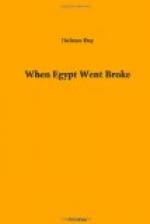Across the street sat a little building above the door of which was a sign inscribed, “Usial Britt, Shoemaker.” That it was a dwelling as well as a shop was indicated when a bare and hairy arm was thrust from a side window and the refuse in a smoking iron spider was dumped upon the snow. Simultaneously it was shown that more than one person tenanted the building: a man, bareheaded, but with a shaggy mat of roached hair that served in lieu of a hat, issued from the door. The wanton luxuriance of the hair would have stirred envy in any baldheaded man; but Tasper Britt exhibited a passion that was more virulent than envy.
The man who came forth was “Prophet Elias.” It was the newcomer, the religious fanatic, the exhorter against oppression of the people by usury, the fearless declaimer who named Tasper Britt in diatribe and was setting the folks by the ears.
The Prophet’s morning greeting did not make for amity. He stood straight and pointed in turn to the visible statues and then to Tasper Britt, in person. “Baal, and the images of Baal!” he shouted. “Stone, all three!”
Then he stepped from the door and spread a prodigiously big umbrella—an umbrella striped in dingy colors and of the size of the canopies seen over the drivers of delivery wagons. The employment of such a shield from the sun in midwinter indicated that the Prophet was rather more than eccentric; his garb conveyed the same suggestion. He wore a frayed purple robe that hung on his heels when he came striding across the street. On a broad band of cloth that once had been white, reaching from shoulder to waist, diagonally across his breast, were the words, “The Light of the World.”
Tasper Britt surveyed him with venomous gaze as he advanced. But Britt shifted his stare and put additional venom into the look he gave a man who came to the door and stood there, leaning against the jamb and surveying the scene with a satisfied grin. There was no need of the name “Britt” above his head to proclaim his kinship with the man who stood on the tavern porch. The beard of the Britt in the door was gray, and his head was bald. But he was Tasper Britt, in looks, as Britt unadorned ought to have been. There was something like subtle reproach in his sticking to nature as nature had ordained. And the folks of Egypt had been having much to say about Usial Britt putting this new touch of malice into the long-enduring feud between twin brothers—even though he merely went on as he had been going, bald and gray. But because Usial had taken to going about in public places wherever Tasper appeared, and unobtrusively got as near his brother as possible on those occasions, and winked and pointed to himself and suggested “Before using!” the malice was apparent.
Usial, in the door, stroked his smooth poll complacently and grinned.
Tasper, on the porch, shook his fist.
Prophet Elias marched close to the porch and struck an attitude. “Hear ye! Hath not Job said, ’The triumphing of the wicked is short, and the joy of the hypocrite but for a moment’?”




